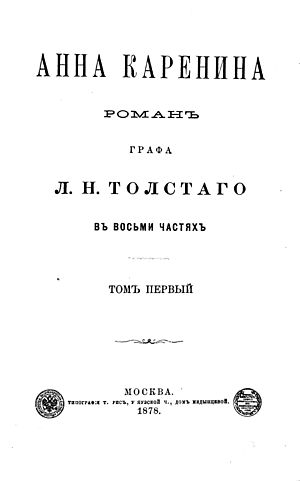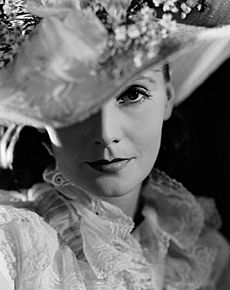Anna Karenina facts for kids

Cover page of the first volume of Anna Karenina, Moscow, 1878
|
|
| Author | Leo Tolstoy |
|---|---|
| Original title | Анна Каренина |
| Translator | Constance Garnett (initial) |
| Country | Russia |
| Language | Russian |
| Genre | Realist novel |
| Publisher | The Russian Messenger |
|
Publication date
|
1878 |
| Media type | Print (serial) |
| Pages | 864 |
Anna Karenina (Russian: «Анна Каренина», IPA: [ˈanːə kɐˈrʲenʲɪnə]) is a famous novel written by the Russian author Leo Tolstoy. It was first published as a book in 1878. Many people believe it is one of the greatest books ever written. Tolstoy himself said it was his first true novel.
The story explores important ideas like family, marriage, and life in Imperial Russia. It also looks at the differences between living in the countryside and living in cities.
Trains are a big part of the story. Many important events happen on trains or at train stations in places like Saint Petersburg. The novel takes place during a time of big changes in Russia, led by Emperor Alexander II of Russia. The book has been made into many different things, including theater plays, operas, movies, TV shows, and ballets.
Contents
Meet the Main Characters

- Anna Arkadyevna Karenina (Анна Аркадьевна Каренина): She is Stepan Oblonsky's sister. She is married to Karenin and later falls in love with Vronsky.
- Count Alexei Kirillovich Vronsky (Алексей Кирилovich Вронский): He is a cavalry officer and Anna's love interest.
- Prince Stepan "Stiva" Arkadyevich Oblonsky (Степан "Стива" Аркадьевич Облонский): He is a government worker and Anna's brother. He is 34 years old.
- Princess Darya "Dolly" Alexandrovna Oblonskaya (Дарья "Долли" Александровна Облонская): She is Stepan's wife and is 33 years old.
- Alexei Alexandrovich Karenin (Алексей Александрович Каренин): He is an important government official and Anna's husband. He is twenty years older than Anna.
- Konstantin "Kostya" Dmitrievich Levin/Lyovin (Константин "Костя" Дмитриевич Лёвин): He is Kitty's admirer and a good friend of Stiva. He owns land and is 32 years old.
- Nikolai Dmitrievich Levin/Lyovin (Николай Дмитриевич Лёвин): He is Konstantin's older brother.
- Sergei Ivanovich Koznyshev (Сергей Иванович Кознышев): He is Konstantin's half-brother and a well-known writer. He is 40 years old.
- Princess Ekaterina "Kitty" Alexandrovna Shcherbatskaya (Екатерина "Кити" Александровна Щербацкая): She is Dolly's younger sister and later becomes Levin's wife. She is 18 years old.
- Prince Alexander Shcherbatsky (Александр Щербацкий): He is Dolly and Kitty's father.
- Princess Shcherbatsky: She is Dolly and Kitty's mother. Her first name is not given.
- Princess Elizaveta "Betsy" Tverskaya (Елизавета "Бетси" Тверская): She is Anna's rich friend and Vronsky's cousin.
- Countess Lidia (or Lydia) Ivanovna (Лидия Ивановна): She leads a group of high-society people that includes Karenin.
- Countess Vronskaya: She is Vronsky's mother.
- Sergei "Seryozha" Alexeyich Karenin (Сергей "Серёжа" Каренин): He is Anna and Karenin's son, 8 years old.
- Anna "Annie" (Анна "Ани"): She is Anna and Vronsky's daughter.
- Agafya Mikhailovna (Агафья Михайловнa): She was Levin's nurse and is now his trusted housekeeper.
What the Story is About

The novel has 8 parts and 239 chapters. It starts with a quote from the Bible: "Vengeance is mine; I will repay."
The book also begins with one of its most famous lines:
Все счастливые семьи похожи друг на друга, каждая несчастливая семья несчастлива по-своему.
Vse schastlivyye sem'i pokhozhi drug na druga, kazhdaya neschastlivaya sem'ya neschastliva po-svoyemu.
Happy families are all alike; every unhappy family is unhappy in its own way.
The story follows two main plots. One is about Anna Karenina, a charming woman who lives in high society. She leaves her husband and son for a dashing cavalry officer, Count Vronsky. Her choice leads to many difficulties and challenges in her life.
The other plot is about Konstantin Levin, a country landowner. He struggles with his faith and tries to find meaning in life through farming, family, and simple living. He eventually marries Kitty Shcherbatskaya. The novel shows how these two stories connect and how people deal with love, family, and society's rules in 19th-century Russia.
Historical Background
The story of Anna Karenina happens during a time of fast changes in Russia. These changes were started by Emperor Alexander II of Russia. One of the biggest changes was the Emancipation reform of 1861, which freed serfs (farmers who were tied to the land).
Other changes included new laws, a jury system, and military reforms. There were also new local governments called Zemstvo. Railroads, banks, and factories grew quickly. New business leaders became important, while old land-owning families became less powerful. People also debated new ideas about women's rights and national pride. All these changes are discussed by the characters in the novel.
The train station of Obiralovka, mentioned in the book, is now a town called Zheleznodorozhny, Moscow Oblast.
Many English Translations
Anna Karenina has been translated into English many times by different people. Some of the most well-known translations include those by Constance Garnett, Louise and Aylmer Maude, Rosemary Edmonds, and Richard Pevear and Larissa Volokhonsky. Each translation offers a slightly different way to experience Tolstoy's original words.
Book to Screen: Adaptations
Anna Karenina has been made into many different types of media. These include operas, movies, TV shows, ballets, and even radio dramas. The very first film version was made in 1911, but it no longer exists.
Film and Television Versions
- 1911: Anna Karenina, a Russian film.
- 1914: Anna Karenina, another Russian film.
- 1915: Anna Karenina, an American film with Danish actress Betty Nansen.
- 1918: Anna Karenina, a Hungarian film.
- 1927: Love, an American film starring Greta Garbo. This version changed parts of the story.
- 1935: Anna Karenina, starring Greta Garbo and Fredric March.
- 1948: Anna Karenina starring Vivien Leigh.
- 1953: Anna Karenina, a Russian film.
- 1953: Panakkaari (Rich woman), a Tamil language film.
- 1960: Nahr al-Hob (The River of Love), an Egyptian film.
- 1961: Anna Karenina, a BBC Television show with Claire Bloom and Sean Connery.
- 1967: Anna Karenina, another Russian film.
- 1977: Anna Karenina, a ten-episode BBC series.
- 1975/1979: Anna Karenina, a film of the Bolshoi Ballet production.
- 1985: Anna Karenina, a TV Movie with Jacqueline Bisset and Christopher Reeve.
- 1997: Anna Karenina, an American film made in Russia, starring Sophie Marceau and Sean Bean.
- 2000: Anna Karenina, a British TV series.
- 2012: Anna Karenina, a British film starring Keira Knightley and Jude Law.
- 2013: it:Anna Karenina (miniserie televisiva 2013), an international TV co-production.
- 2015: The Beautiful Lie, an Australian TV series that retells the story in modern times.
- 2017: Anna Karenina: Vronsky's Story, a Russian film.
- 2023: Volver a caer, a Mexican version of the story.
Theatre Shows
- 1992: Helen Edmundson adapted Anna Karenina for a play that toured the UK.
- 1992: Anna Karenina, a musical that opened on Broadway.
- 1994: Anna Karenina, a musical by Hungarian writers Tibor Kocsák and Tibor Miklós.
Ballet Performances
- 1979: Anna Karenina, choreographed by André Prokovsky, with music by Tchaikovsky.
- 2005: Anna Karenina, choreographed by Boris Eifman, also with music by Tchaikovsky.
- 2019: Anna Karenina, choreographed by Yuri Possokhov.
Radio Dramas
- 1949: The MGM Theater of the Air, a radio show starring Marlene Dietrich.
Opera Productions
- 1978: Anna Karenina, an opera composed by Iain Hamilton.
- 2007: Anna Karenina, an opera composed by David Carlson.
See also
 In Spanish: Ana Karenina para niños
In Spanish: Ana Karenina para niños
- Leo Tolstoy bibliography
 | Audre Lorde |
 | John Berry Meachum |
 | Ferdinand Lee Barnett |

